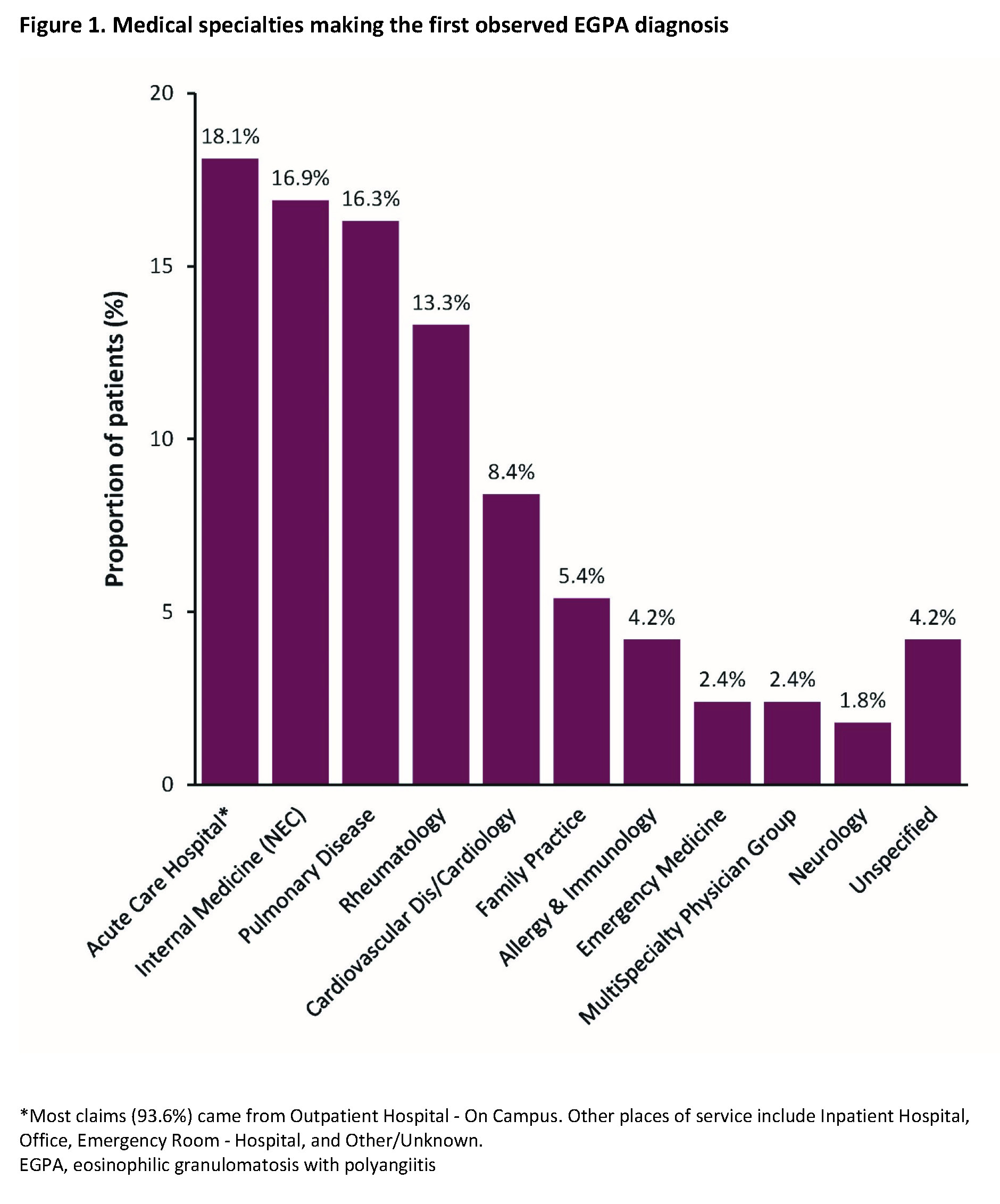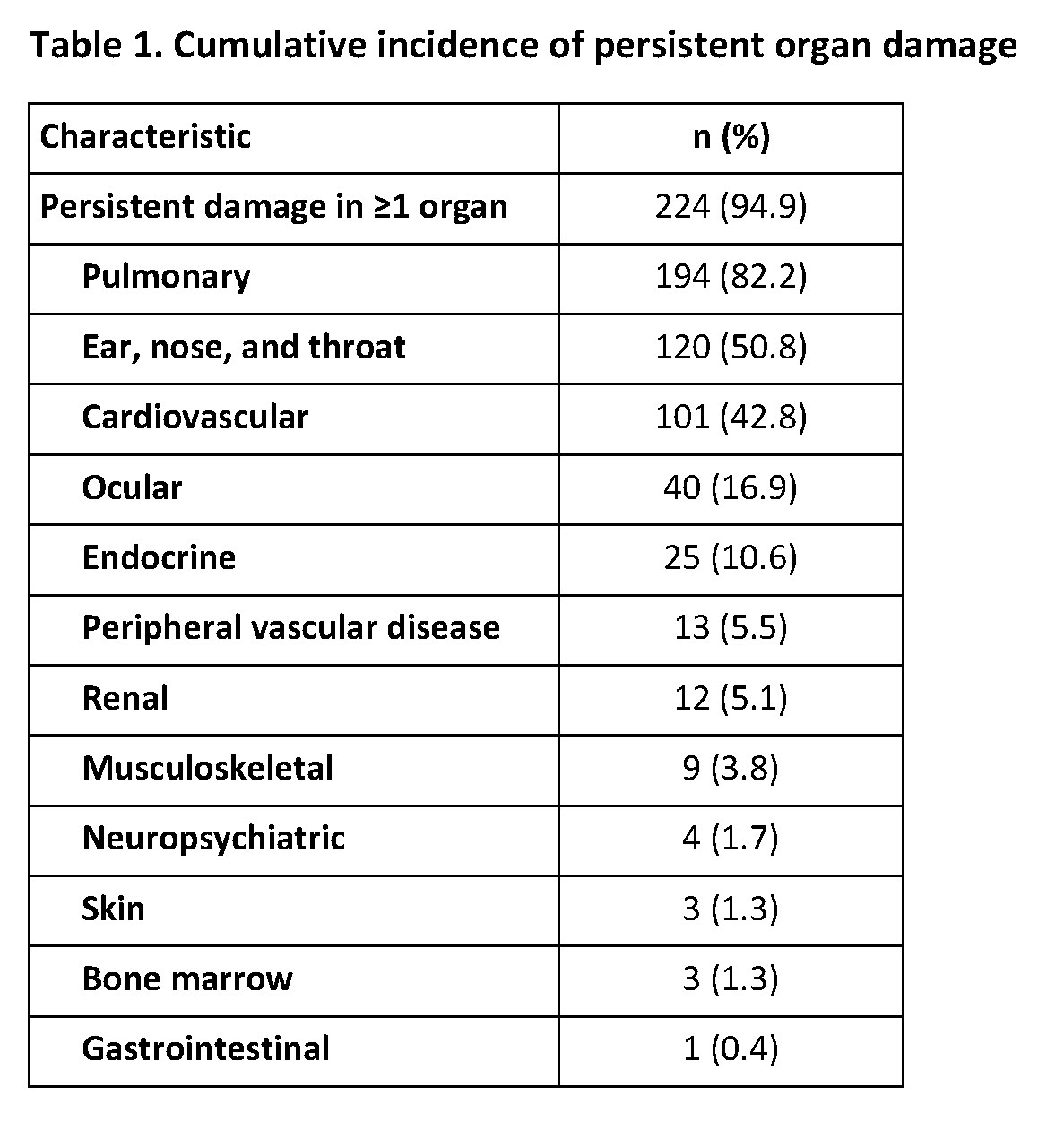Session Information
Date: Monday, November 13, 2023
Title: (1534–1553) Vasculitis – ANCA-Associated Poster II: Epidemiology, Outcomes, & Classification
Session Type: Poster Session B
Session Time: 9:00AM-11:00AM
Background/Purpose: Raising awareness of eosinophilic granulomatosis with polyangiitis (EGPA), a rare necrotizing small-to-medium vessel vasculitis, amongst clinicians is important to ensure timely diagnosis and treatment. EGPA is associated with substantial disease burden and impact on health-related quality of life, with patients often facing a long and complex pathway from symptom onset to diagnosis. We aimed to characterize the diagnostic journey of patients with EGPA using a retrospective analysis of US administrative health insurance claims (Merative™ MarketScan® databases).
Methods: Patients with newly diagnosed EGPA from 2017 to 2021 with ≥12 months of continuous pre-diagnosis health plan enrollment and ≥1 inpatient or ≥2 outpatient EGPA-related diagnoses (≥90 days apart, ICD-10-CM code M30.1) were included. Follow-up was from date of first observed EGPA diagnosis (index date; ID) until health plan disenrollment or database end. Drug therapies and outpatient visits prior to ID, specialties making incident EGPA diagnosis, time from first observed symptom to ID, and persistent vasculitic damage were analyzed.
Results: In total, 236 patients with incident EGPA were identified; 88% had commercial insurance. At ID, mean (standard deviation [SD]) age was 50.4 (14.5) years, 88% were < 65 years, and 58% were female. In the year before ID, 80% of patients were receiving systemic glucocorticoids, most commonly oral glucocorticoids (OGCs; 77%), 13.6% were receiving immunosuppressants, and 12.7% biologics. Among the 164 patients receiving prednisone, the mean (SD) daily dose was 28 (17) mg, for a mean (SD) of 3.2 (3.5) months. In the year before ID, 96% of patients had at least one outpatient visit; most frequently family practice (50%) and internal medicine (45%). The most frequent (mean [SD]) outpatient visits were to allergy and immunology (6.2 [8.0]), family practice (4.7 [4.2]), internal medicine (4.3 [3.6]), otolaryngology (3.7 [3.0]), and pulmonary disease (3.3 [4.4]). Overall, 31% and 70% of patients had their first observed EGPA diagnosis in an inpatient and/or outpatient setting, respectively, which were most commonly made by acute care hospital specialists, followed by internal medicine, and pulmonary disease specialists (Figure 1). The mean (SD) time from first observed EGPA symptom or organ damage in the claims record to first observed EGPA diagnosis was 25.0 (15.0) months, with >99% of patients experiencing symptoms or organ damage prior to their first observed diagnosis. At ID, 95% of patients had persistent damage to at least one organ. Most patients had pulmonary damage, followed by ear, nose, and throat, and cardiovascular damage (Table 1).
Conclusion: Prior to their first observed diagnosis, most patients with EGPA were prescribed OGCs and made frequent health care provider (HCP) visits. At the time of their first observed diagnosis, the vast majority of patients had already experienced an EGPA event/organ damage for >2 years.These data highlight that greater awareness of EGPA is needed amongst HCPs to facilitate more rapid diagnosis, minimize organ damage, reduce exposure to therapies with harmful side effects, and better enable a multidisciplinary approach.
To cite this abstract in AMA style:
Dolin P, Kielar D, Shavit A, Keogh K, Rowell J, Edmonds C, Meyers J, Esterberg E, Nham T, Chen S. Diagnosis Pathways in Patients with Eosinophilic Granulomatosis with Polyangiitis (EGPA): A Retrospective Analysis of US Health Insurance Claims Data [abstract]. Arthritis Rheumatol. 2023; 75 (suppl 9). https://acrabstracts.org/abstract/diagnosis-pathways-in-patients-with-eosinophilic-granulomatosis-with-polyangiitis-egpa-a-retrospective-analysis-of-us-health-insurance-claims-data/. Accessed .« Back to ACR Convergence 2023
ACR Meeting Abstracts - https://acrabstracts.org/abstract/diagnosis-pathways-in-patients-with-eosinophilic-granulomatosis-with-polyangiitis-egpa-a-retrospective-analysis-of-us-health-insurance-claims-data/


